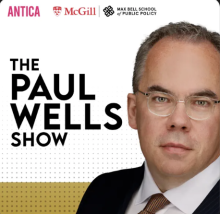March 24, 2025 | In a recent interview with CBC, Taylor Owen, Director of the Centre for Media, Technology and Democracy, warned that Canada’s online media environment is more fragile and susceptible to manipulation than ever before. As trust in journalism declines, Owen explains, disinformation that once existed on the fringes is now entering the mainstream—largely through social media platforms.


April 16, 2025 | In an interview on The Paul Wells Show, Taylor Owen, founding director of the Centre for Media, Technology and Democracy at McGill University, raised urgent concerns about online election interference in Canada. Drawing from his work with the Media Ecosystem Observatory, Owen explains how foreign and domestic actors attempt to sway public opinion through misinformation and platform manipulation. He emphasizes that while online interference is not always overt, its cumulative effect undermines democratic processes.

April 18, 2025 | In an interview with The Guardian, Media Ecosystem Observatory Executive Director Aengus Bridgman warned of a dramatic surge in fake political content on social media as Canadians prepare to vote in the federal election. Bridgman explains that, despite Meta’s ban on Canadian news sharing, more than half of Canadians still rely on Facebook for political information—now increasingly shaped by fake headlines, fraudulent ads, and deepfake videos.

April 9, 2025 | Aengus Bridgman from the Media Ecosystem Observatory was interviewed by CBC’s Farah Nasser, where he highlighted the dangers of unregulated social media during elections. With a vast, active audience and minimal oversight, social media platforms have become prime spaces for information manipulation. Bridgman discusses how misinformation spreads on these platforms and shares key insights on what to look out for in social media feeds as the election approaches.

March 21, 2025 | Aengus Bridgman, director of the Media Ecosystem Observatory (MEO), explains what worries him about the information voters are getting online this election and how to make sure one doesn't get duped on a podcast The House with Catherine Cullen. Since the last election social media landscape has changed a lot since the online news act came into affect.
Montreal, QC (June 7, 2023) — The Government of Canada has announced $5.5 million to create the Canadian Digital Media Research Network (CDMRN), a first-of-its-kind research community in Canada aimed at strengthening our information resilience and safeguarding our democracy.

March 21, 2022 | Screen Time, a new podcast co-hosted by Taylor Owen of the Max Bell School's Centre for Media, Technology and Democracy, delves into the relationship between kids and the rapidly changing digital world. This eight-episode series will explore topics like cognitive development, the metaverse, online harms, and more.

Misinformation linked to the COVID-19 pandemic is playing a larger-than-expected role in the federal election, fuelling protests and support for the People’s Party of Canada, experts say. Throughout the election, hostile protests have dogged the campaign of Liberal leader Justin Trudeau. On Monday, anti-vaccination protests targeted hospitals across the country – the ongoing protests have also garnered significant media coverage, getting more attention than issues like Afghanistan or gun control.

August 30, 2021 | In this CBC interview, Aengus Bridgman, director of the Media Ecosystem Observatory's Canadian Election Misinformation Project, provides an overview of the Project's first memo: an analysis of a misleading video tweeted by Liberal candidate Chrystia Freeland.

August 30, 2021 | In this CBC interview, Aengus Bridgman, director of the Media Ecosystem Observatory's Canadian Election Misinformation Project, provides an overview of the Project's first memo: an analysis of a misleading video tweeted by Liberal candidate Chrystia Freeland.

August 24, 2021 | In this CBC Radio interview, Aengus Bridgman, director of the Canadian Election Misinformation Project, comments on manipulated media and misinformation in the ongoing federal election campaign.

August 24, 2021 | Election 44 is underway, and the Media Ecosystem Observatory's Canadian Election Misinformation Project is hard at work tracking election mis- and disinformation. Learn more about the Project in this interview with its director, Aengus Bridgman.

August 26, 2021 | The Media Ecosystem Observatory's Canadian Election Misinformation Project is out with its first memo of the 44th Canadian federal election campaign. Learn about five election misinformation findings from the controversy surrounding Liberal candidate Chrystia Freeland’s recent tweet.

August 19, 2021 | Mis- and dis-information are a growing threat to the integrity of free and fair elections and to the strength of democracies the world over. That is why McGill University and the University of Toronto are announcing the creation of the Canadian Election Misinformation Project to monitor and respond to mis- and disinformation incidents and threats during the 44th Canadian federal election.
Learn more about the project in this McGill Reporter article.

August 18, 2021 | Facebook and other social media companies have done a lot over the past five years to address the problem of their platforms' being used by bad actors to influence elections or spread misinformation. However, they still have a way to go. The Media Ecosystems Observatory's Aengus Bridgman comments on the steps Facebook is taking to prevent their platform from being misused during the federal election campaign.
